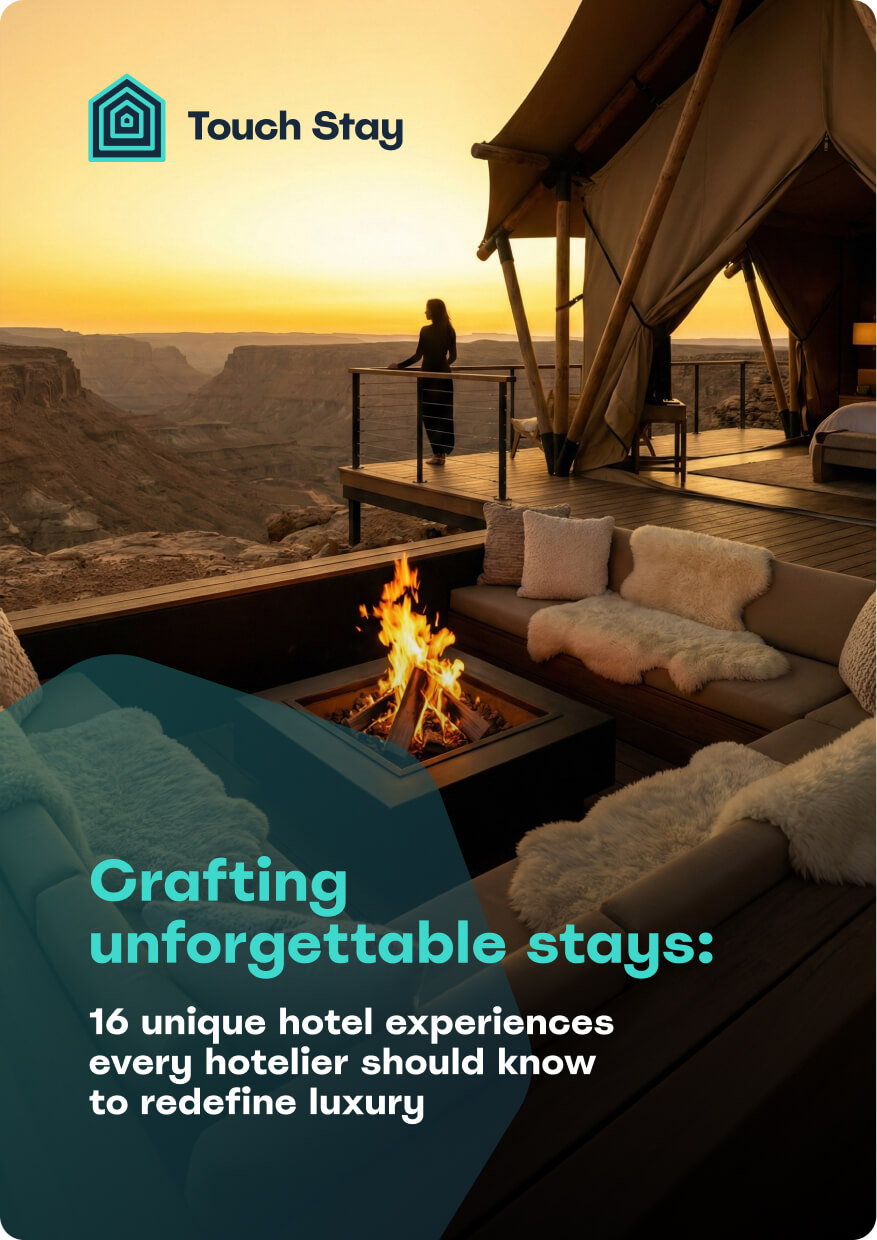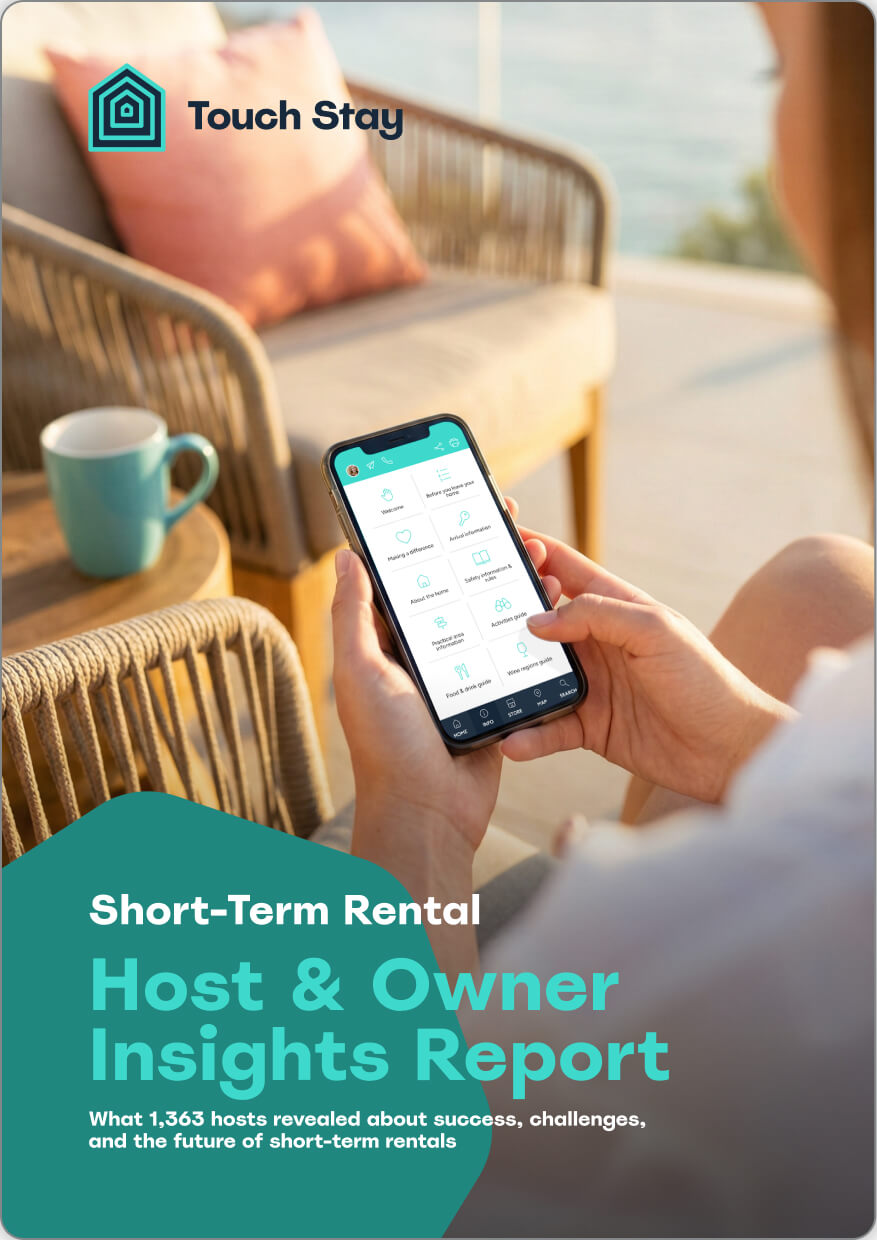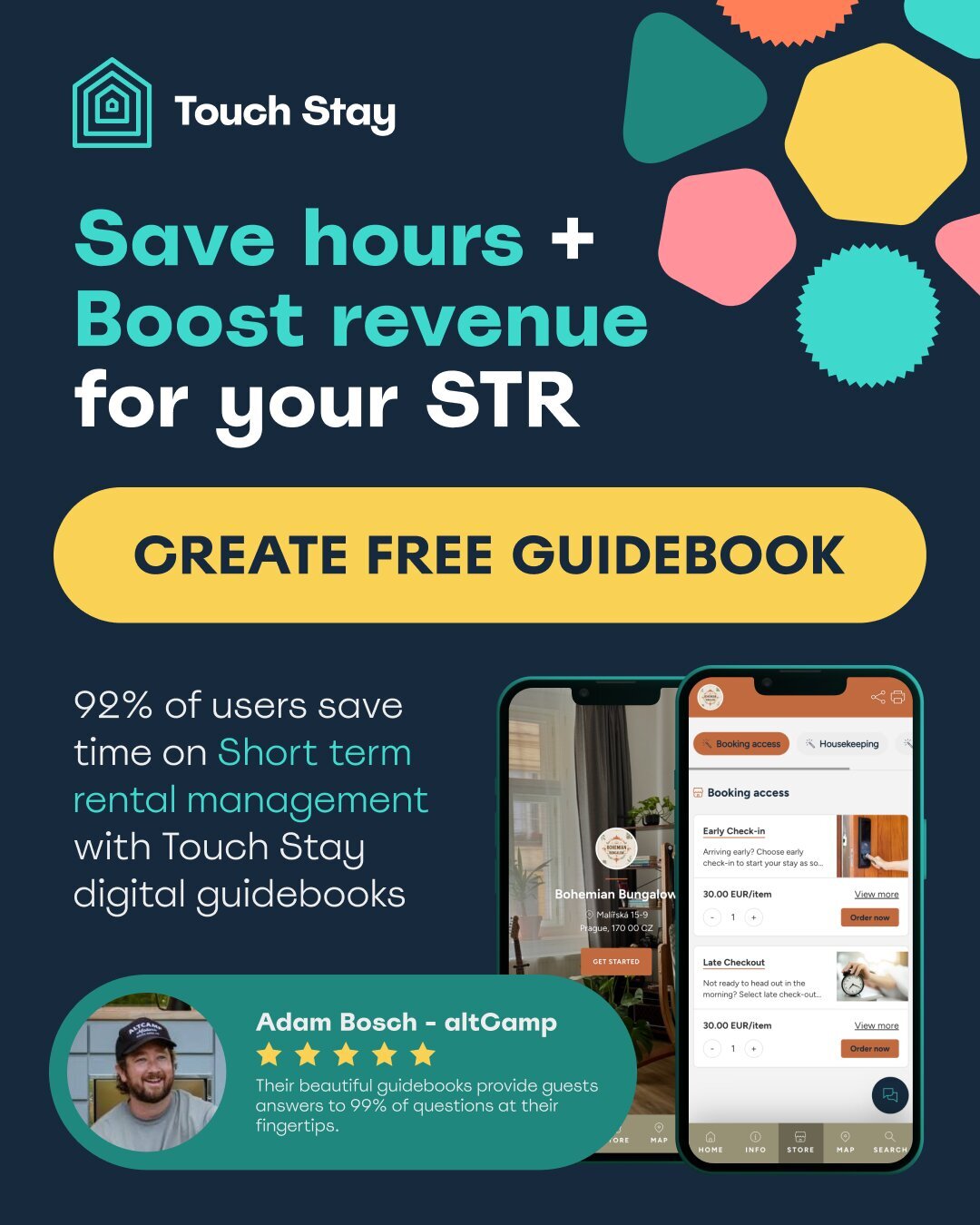In an increasingly connected world, the concept of home-sharing has become a cornerstone of modern travel. Platforms like Airbnb have revolutionised how we experience holidays and temporary stays, offering unique accommodations and a sense of local immersion. However, the convenience and accessibility of short-term rentals also bring important considerations regarding safety and security for both guests and hosts.
While Airbnb has robust policies and features designed to protect its community, understanding best practices and taking proactive steps can significantly enhance your peace of mind. This comprehensive guide will delve into essential safety and security measures, from adhering to Airbnb's guidelines, practical tips for a safer stay, plus how a digital guidebook can elevate both the guest and hosting experience.
Read on or skip to a section:
- What does Airbnb allow and not allow?
- 13 Airbnb safety tips for guests
- 11 Airbnb security tips for hosts
- Final thoughts
Take your guest experience to the next level with a Touch Stay digital guidebook!
What does Airbnb allow and not allow?
Airbnb operates with a clear set of community standards and policies to ensure a safe and respectful environment. These rules are crucial for both guests and hosts to understand and adhere to, as non-compliance can lead to penalties, including removal from the platform.
Key aspects of Airbnb's rules include:
- Safety Standards: Hosts must maintain a safe environment, including functional smoke and carbon monoxide detectors, a fire extinguisher, and ensuring the property is free from hazards.
- Privacy and Security: Strict rules govern security device placement and disclosure, particularly concerning privacy.
- Guest Verification: Airbnb encourages and, in some cases, requires guests to verify their identity, adding a layer of trust.
- Communication and Payments: All official communication and transactions should ideally happen through the Airbnb platform for support and protection.
- Host Responsibilities: Hosts are expected to accurately represent listings, maintain cleanliness, and provide essential amenities. They must also comply with local laws and regulations, which vary significantly by location (e.g., UK fire safety, gas safety, and electrical safety standards).
- Guest Responsibilities: Guests are expected to treat the property and hosts with respect, adhere to house rules, and communicate any issues promptly.
Pro tip: Discover how to create and enforce house rules with an Airbnb guest book
Airbnb’s indoor security camera ban
A significant update to Airbnb's policy came into effect on 30 April 2024, with a complete ban on indoor security cameras and recording devices in listed properties. Previously, cameras were permitted in common areas if clearly disclosed. This change was implemented to enhance guest privacy and address concerns about hidden surveillance.
Key points of this ban are:
- No Interior Cameras: Hosts cannot have security cameras or recording devices monitoring any part of a listing's interior (hallways, bedrooms, bathrooms, living rooms, guest houses). This applies even if devices are turned off.
- Hidden Cameras Strictly Prohibited: The use of hidden or disguised cameras is, and always has been, strictly forbidden.
- Common Areas Included: This prohibition extends to common areas and shared spaces within private room listings.
- Exterior Cameras Allowed with Disclosure: Exterior security cameras and recording devices are permitted, provided they don't monitor areas with a high expectation of privacy (e.g., inside an enclosed outdoor shower). Hosts must clearly disclose their location in the listing description (e.g., "I have a camera in my front garden").
- Noise Decibel Monitors Permitted (with Disclosure): Noise decibel monitors are allowed indoors if disclosed and not in bedrooms, bathrooms, or sleeping areas. Exact location disclosure isn't required.
This policy update significantly impacts how hosts approach security and underscores Airbnb's commitment to protecting guest privacy.
13 Airbnb safety tips for guests:
When staying at an Airbnb, your personal safety and security should always be a top priority. While hosts are responsible for providing a safe environment, there are numerous steps guests can take to ensure a smooth and worry-free stay.
1. Pay attention to reviews
Reviews are a goldmine of information. Before booking, thoroughly read what previous guests have said about the property, the host, and the neighbourhood. Look for patterns in comments about cleanliness, noise, or safety concerns. Check if the host is responsive and helpful. Pay attention to recent reviews, as conditions can change.
2. Research the locality
Understanding the neighbourhood is crucial. Use online maps to explore the street view; look for well-lit streets and nearby amenities. Search local news or forums for information on safety or typical activities. If using public transport, assess the safety of routes and stops, especially at night.
3. Search for Airbnb rentals with lockboxes
For self-check-in and flexibility, many hosts use lockboxes for key access. This can enhance security by removing the need for in-person key handovers. Ensure the host provides clear access instructions.
4. Pay for the stay only through the Airbnb website
This is a fundamental rule for your protection. Airbnb's platform offers various safeguards, including AirCover, which provides support for issues like booking assistance and fraud prevention. Avoid off-platform payments; report any such requests immediately.
5. Use trustworthy digital wallets
If using digital wallets for payments, ensure they are reputable and have strong security features. Enable two-factor authentication for added security. Avoid public Wi-Fi for financial transactions and be wary of phishing attempts.
6. Change the lock code (if possible)
For properties with smart locks that allow guest code changes, this is a proactive security measure. Always ask the host if it's permissible and if they can provide instructions. Remember to revert the code or follow the host's instructions upon departure.
7. Use a portable door lock
These small, affordable devices can provide an extra layer of security, especially if you're uneasy about the existing lock. They are easy to install, fitting into the door frame or over the existing lock, offering peace of mind.
8. Look for hidden cameras
Given the recent ban on indoor cameras, guests should be vigilant. While Airbnb enforces its policy, do a quick check upon arrival. Scan for small holes, unusual electronics, or devices pointed at private areas. Check common hiding spots like smoke detectors or alarm clocks. Shining a flashlight into potential spots might reveal a camera lens reflection.
9. Check smoke detectors in the room
Functional smoke detectors are crucial. It's recommended to test them upon arrival. Locate all detectors (required in every bedroom and common area in the UK) and press the test button. Report any non-working or missing detectors to your host and Airbnb immediately.
10. Bring your own padlock
If travelling with valuables or staying in a shared space, a small padlock can be useful for securing your luggage or a locker, adding an extra layer of security against casual theft.
11. Use your own VPN
When connecting to public Wi-Fi networks in your Airbnb, a Virtual Private Network (VPN) can protect your data. A VPN encrypts your internet traffic, making it harder for others to intercept your online activities, especially for sensitive accounts.
12. Put a tracker on your bags and luggage
For added security against lost or stolen luggage, consider using a smart tracker like Apple AirTags or Tile. These devices offer real-time location tracking, providing peace of mind during your travels.
13. Bring an ultralight flashlight
A small, powerful flashlight can be invaluable. It's essential for navigating during power outages, exploring poorly lit areas, and can even be used to signal for help in emergencies.
11 Airbnb security tips for hosts:
As an Airbnb host, you're not just offering a place to stay; you're also responsible for providing a safe and secure environment for your guests. Implementing robust security measures not only protects your property but also enhances your guests' experience and contributes to positive reviews.
1. Install a keyless entry
Moving beyond traditional keys significantly boosts security and convenience. Keyless entry systems allow you to manage access remotely and provide unique codes for each guest, which expire upon checkout, eliminating the risk of lost keys.
2. Use smart doorbells
Smart doorbells with cameras and two-way audio provide an excellent first line of defence. They allow you to screen visitors, monitor package deliveries, deter unwanted individuals, and offer remote assistance to guests.
3. Try video sensors
While indoor cameras are banned, external video sensors can be valuable for monitoring perimeters or specific outdoor areas. Place them at entry points like driveways or garden gates to receive motion-activated alerts. Remember to adhere strictly to Airbnb's disclosure policy for all external cameras.
4. Invest in door and motion alarms
These devices offer an additional layer of security. Install door and window sensors on external doors and ground-floor windows, and motion detectors in key areas like hallways, to receive immediate alerts to your phone if an alarm is triggered.
5. Verify guests and their profiles
Utilise Airbnb's identity verification processes. Prioritise guests with verified IDs and carefully read guest reviews for any red flags. Don't hesitate to message potential guests before booking to clarify their trip purpose.
Pro tip: Learn more with our Airbnb background check: tips for guest screening
6. Install security cameras (carefully)
Airbnb has a strict camera policy: only external cameras are permitted with proper disclosure. Focus on outdoor areas where guests have no expectation of privacy (e.g., front door, driveway). You must clearly state the presence and location of all external cameras in your listing description. Avoid audio recording in areas where guests might have a reasonable expectation of privacy.
7. Create a house manual with safety info
A comprehensive house manual is invaluable for guest safety. Provide guests with easy access to all essential safety information, emergency contacts, and house rules. Outline emergency procedures, appliance instructions, and local emergency numbers. A digital guidebook solution like Touch Stay ensures this information is always accessible on guests' phones or tablets, even offline.
Make guest safety a seamless part of their stay. Discover how Touch Stay can help you create a comprehensive and user-friendly digital house manual.
8. Conduct regular maintenance
Proactive property maintenance is crucial. Regularly inspect for structural issues (loose railings, uneven steps), have electrical systems and appliances checked, and ensure all portable electrical appliances are PAT tested. Check for leaks, and keep outdoor areas well-maintained and adequately lit.
9. Install fire safety equipment
Fire safety is paramount and a legal requirement for UK short-term rentals. Install interlinked, hard-wired smoke detectors in all appropriate rooms, a heat alarm in the kitchen, and carbon monoxide detectors if you have fuel-burning appliances. Place suitable fire extinguishers and fire blankets in accessible locations, particularly the kitchen. As of October 1, 2023, a written fire risk assessment is a legal requirement in England and Wales for Airbnb owners.
10. Prepare an emergency exit plan
In the rare event of an emergency, a clear and well-communicated exit plan can save lives. Create a simple map showing all exits and escape routes from each room, and display it prominently (e.g., on the back of the main door or within your digital house manual). Ensure all escape routes are always clear.
11. Communicate with your guests about safety and security
Open and transparent communication builds trust. Share key safety information (lock operation, safety equipment location, emergency contacts) with guests pre-arrival. Briefly explain important safety features during a welcome or clearly outline them in your digital guidebook. Encourage questions and keep all communications about bookings within the Airbnb messaging system.
Pro tip: Want to take the shortcut to Superhost Status? Check out our ultimate Airbnb host checklist: a step-by-step guide to successful hosting
Final thoughts
Ensuring safety and security in the Airbnb ecosystem is a shared responsibility between guests and hosts. By diligently applying these tips, from thorough research for guests to comprehensive safety provisions for hosts, the home-sharing experience can remain enjoyable and worry-free. Proactive measures, clear communication, and adherence to platform policies are key to fostering a safe and welcoming environment for everyone.
For hosts, streamlining your communication and providing essential safety information is made effortless with a digital guidebook. Empower your guests with all the knowledge they need, right at their fingertips.
Ready to enhance your guests' experience and simplify your hosting? Sign up for a free 14-day trial of Touch Stay today!

Ned
Ned has clocked up over 11 years in digital marketing and comms, with a strong focus on creating engaging content for a range of brands and agencies. When he’s not writing, he can be found digging for records, peering through his telescope at the night sky, or onboard his local lifeboat where he volunteers as a crewmember.
Be the first to know!
Join our newsletter for early access to:
- ✅ Free guides
- ✅ Pro tips & tricks
- ✅ Time saving tutorials
- ✅ Latest blog posts
- ✅ Checklists & templates






















